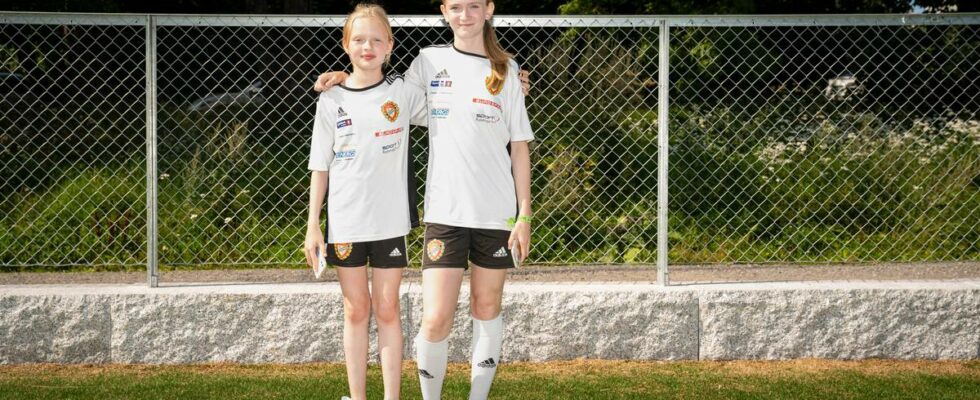– I used to play quite a lot, but not anymore. Alida Guddal Hjelmland (13) has traveled from Rosendal in Vestland to Ekerbergsletta this week to take part in the Norway Cup. She is one of several young people who play less than before. Screen time of 2 hours and 27 minutes, 72 percent less than last week, says Hjelmland. Lund has screen time of 5 hours and 33 minutes, also there 34 percent less than fewer weeks. Photo: Alf Simensen / news – I rather hang out with friends, or on tiktok then, she admits. Teammate Tuva Lund (12, soon to be 13) says she plays Fortnite and Roblox daily. – It is quite a lot, comments Hjelmeland In the last week, however, screen time has decreased. In fact, a decrease of 72 and 34 per cent. The time has rather gone to football in the sun. 2 out of 3 children and young people between the ages of 9 and 15 cheat every single day, figures from Statistics Norway show. Photo: Alf Simensen / news Fewer vultures now than before the pandemic A new survey from the Norwegian Media Barometer shows that the number of children between the ages of nine and fifteen who are vultures has never been lower. 2 out of 3 children and young people between the ages of 9 and 15 cheat every single day, figures from Statistics Norway show. – We have never measured anything so low for this age group here, says Andreas Øvsthus in SSB to news. 64 per cent of children between 9 and 15 play on a daily basis, and it has never been this low before, says Andreas Østhus in SSB. He adds that the first number they have is from the first measurement made in 2015. But since then they have not had such low numbers. The Norway Cup takes place at Ekerbergsletta this week. Photo: Alf Simensen / news Social media can be the cause Game researcher Beate Hygen at NTNU researches the effect games have on people. She believes that there is no single answer to why this age group now plays less. – It could be that more people are drawn to social media, it is very easily accessible and something that can take quite a lot of time. Social media, attention, school work and the quality of games can have something to say, she thinks. – Watching “shorts” or “reels” is more and more common, fast video snippets and you then get used to things going a bit fast, says Hygen. In gaming on PC or consoles, there are a little more measures to rig up and the games are more complex. Jardar Bruland Tonning (13) mostly plays chess, but also shooting games. Photo: Alf Simensen / news Jardar Bruland Tonning (13) mostly plays chess on mobile and PC, but he agrees that he plays less than before. When news meets him, he plays chess on the phone while talking to us. – I like to play on the board, but it is not always possible to have it with you. He says that if he is at home and has nothing else to do, he can quickly play one to two hours a day. This week, however, it’s football, and then chess. When news had a chat with Tonning, he played chess on his mobile phone while talking to us. Photo: Alf Simensen / news International trend Hygen also points to the fact that there is a trend in, among other places, the United States. – What is striking is that it has decreased so much for this past year, she says. – Is it the start of a downward trend we are seeing here? Will it decrease even more next year? Is it because we are constantly getting used to other types of faster medium? Hygen asks. SSB does not say anything about what is causing the decline. The Directorate of Health recommends that everyone limit their time at rest, says Acting Divisional Director Øyvind Giæver. – So to the extent that the decline in gaming also means a decline in passive screen activity, then it can be positive. 64 per cent of children between 9 and 15 play on a daily basis, and it has never been this low before, says Andreas Østhus in SSB. Photo: Alf Simensen / news So whether this is a positive development depends on what “gaming time” is replaced with, says Giæver. According to the Media Barometer, the number of young people who use the internet daily is about the same as before the pandemic. For Adrian Flyrett-Borgen (10) and Åsmund Bollerud Samdalen (10), gaming is something that allows the friends to hang out almost all the time. – Every day, the two boys answer in unison when asked how often they play. Adrian Flyrett-Borgen (10) and Åsmund Bollerud Samdalen (10) love to play games. Preferably together with each other. Photo: Alf Simensen / news They call each other in the morning and play together. They spend the most time on Fortnite, Minecraft and Play Station. Both mothers have introduced screen time on their phones, but it is not that difficult to get away, the boys say. Published 01.08.2024, at 14.54 Updated 02.08.2024, at 07.08
ttn-69
Fewer young vultures daily – news Norway – Overview of news from different parts of the country

